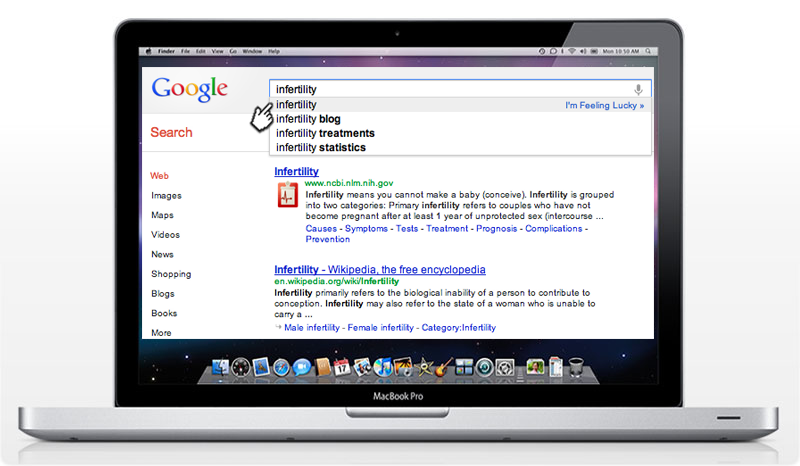By Diane Clapp, BSN, RN
All of us look for resources and information when we are confronted by a difficult medical situation, particularly if there are many options for treatment and many specialists working in the field. One of the best, and sometimes the worst, resources is the internet.

The internet can give you current information, which can help you develop a list of questions to explore with your doctor and can make you feel less isolated and alone. By empowering you with knowledge, it can help you make decisions about your treatment or other family building options.
However, there are numerous pitfalls to using information obtained from the internet. First, the information may not be factual. It may be based on someone’s belief, opinion, or agenda and thus may contain misinformation. Second, it is important to know the source of the information and whether the source has a vested interest in providing it. A drug company website may contain accurate medical information, but because it is also trying to promote a specific product, that information might be biased. Third, websites may not contain current information. What is presented may be outdated or even wrong in light of more recent developments.
Keep in mind the following points when using the internet as a resource:
- Be aware of who the site is funded by, who the sponsors are, and if there is any advertising, because this may make the information on the site less objective. Sites sponsored by non-profit organizations (often with .org addresses) frequently have unbiased, more factual information, but be sure to check the mission statement of the non-profit to get a sense of the values of the organization. Government websites (ending in .gov) are more likely to be unbiased. Finally, hospital and university websites (often ending in .edu) frequently contain unbiased information. The information on these sites is often the most current available, but still, some of this information may not have been subjected to rigorous peer review (the error checking system of science and medicine) and thus may be incorrect or misleading.
- Clinic statistics regarding IVF can be verified at the CDC site www.cdc.gov/reproductivehealth/index.htm. For clinic success rates, look for live birth rates. Clinics often report pregnancy rates that do not reflect the miscarriage rates. It is also important to evaluate clinic statistics for your age group. After age 37 the stats are quite different than those for women who are under age 30.
- If a doctor says on his/her website that they are an infertility specialist, remember that any ob/gyn can call him- or herself that. The highest qualification for an infertility specialist is being Board Certified in Reproductive Medicine. These doctors have completed the required fellowship and have passed both the written and oral exams in this specialty. If a doctor has completed a fellowship, and has passed the written part of the board exam but has not completed the oral exam, he or she is Board Eligible in Reproductive Endocrinology. You can go to www.asrm.org for referrals to an infertility specialist.
- Some of my favorite sites for information on medications and treatments include Physicians’ Desk Reference, Healthline, PubMed, Everyday Health and MedLine Plus.
- When visiting chat rooms and bulletin boards, keep in mind that your situation may not be the same as the writer. Also, you don’t know if the writer is a patient or a professional promoting a specific clinic, or if the information being posted is even accurate.
- Going through infertility is a very emotional experience. It can be filled with ups and downs, hopes and despairs. Sometimes people’s sadness can get displaced as anger at the medical profession or a clinic, and often that is when “bad mouthing” about a clinic or doctor happens in chat rooms.
- Above all: Verify the accuracy of the information you have gotten from the internet by asking your doctor questions, before making any decisions about your treatment based on that information.
The infertility journey is a process. The internet can help you at the stages along the way – from the medical to the emotional – and can provide important information on the variety of family building options. Used correctly, and with proper caution, the internet can be a “friend” as you navigate the infertility challenge.
About the Author
Diane Clapp, BSN, RN, was the Medical Information Director of RESOLVE: The National Infertility Association for 28 years. She retired from private counseling practice, having helped hundreds of individuals and couples in all phases of treatment, from getting started to resolution in their infertility journey.
This article originally appeared in the RESOLVE New England Spring 2007 Newsletter.
